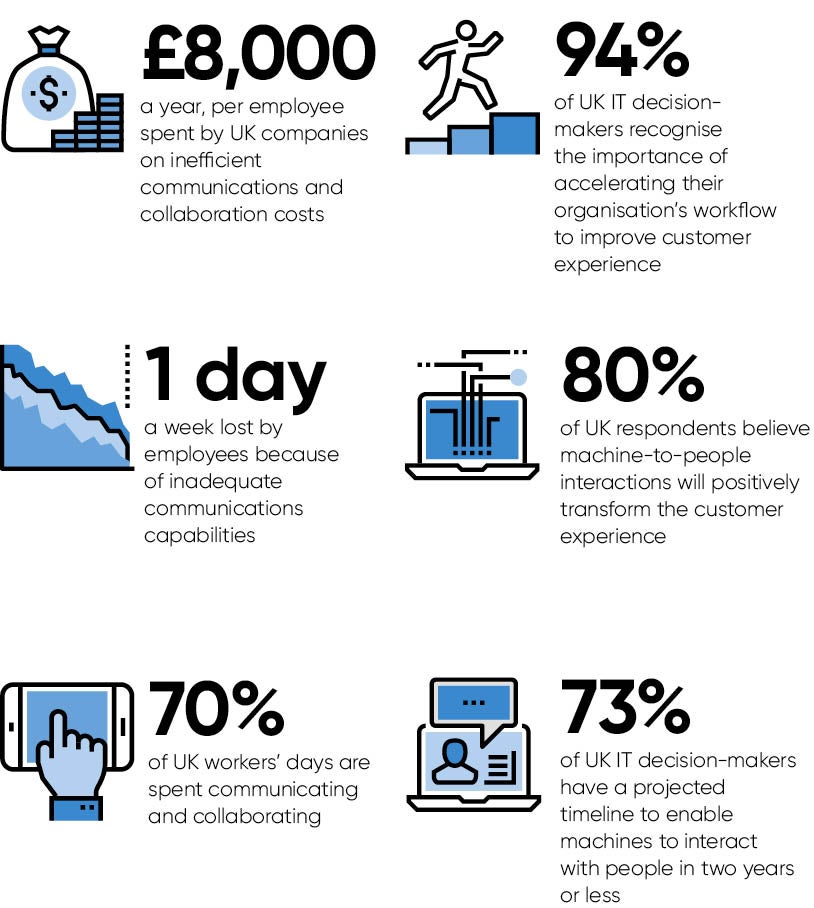The Opinium Workplace Productivity and Communications Technology Report, commissioned by Mitel, a global leader in this space and the largest provider of business communications in Europe, found on average workers waste almost an entire day every week because of this issue. In addition, the same amount of time, or 20 per cent of the working week, is taken up by writing and responding to emails.
Further, 91 per cent of the respondents admitted they fail to make use of online chat and collaboration tools while at work, despite utilising instant messaging and similar applications in their leisure time. This low adoption rate is most likely to be a cultural problem, as many companies are finding themselves lagging behind competitors because of a resistance to update long-established methods of communication, says Jeremy Butt, who oversees Mitel’s operations in Europe, the Middle East and Africa.

Indeed, while the survey’s findings, which offer quantifiable proof that it pays to upgrade communication capabilities and attitudes towards nascent technologies, might be alarming to some C-suiters, Mr Butt is not surprised. “It is possible, just with simple mathematics, to calculate lost productivity time through poor communication and collaboration relative to what it costs,” says the company’s UK-based senior vice president.
“I don’t think most businesses that see these statistics would be overly surprised either. A majority of business leaders are well aware of the deficiencies that exist within their organisation and that their communications aren’t as efficient as they could be. Most companies need to look to the future to remain competitive, increase employee satisfaction, and offer an improved customer experience through advanced communication and collaboration services.
“They recognise a digital transformation is required. Luckily, there is an abundance of answers to their problems in the marketplace. However, businesses need to make sure they are able to provide a seamless communications experience to employees and customers.
“Digital transformation is on everyone’s lips at the moment, but that means a lot of different things to different people. For some it might be a case of moving customers to online ordering and therefore switching from traditional to electronic-based media. Within the communications space, it’s also about how easy it is to collaborate, and connectivity is critical. In this area, digital transformation is about allowing people to connect how they want, via telephony, instant messaging, video conferencing and so on, wherever they want and seamlessly.
Changing an organisation’s communication culture has the power to not only fuel productivity, it can also boost employee satisfaction and, most importantly, improve customer engagement
“Nowadays people expect to be able to be on a voice call and quickly flip to a video or share something on the screen. For me, digital transformation is about enabling the individual to work how it best suits them in their particular circumstances, wherever they might be working from. Sometimes it’s about looking for better work-life balance, at the same time as being more available.”
Changing an organisation’s communication culture has the power to not only fuel productivity, it can also boost employee satisfaction and, most importantly, improve customer engagement. One of the biggest barriers business leaders must overcome is the fallacious fear that digital transformation costs an exorbitant amount.
“There are different ways of doing it,” says Mr Butt. “Some organisations just rip out everything they have and replace it with new kit. Others will not do a wholesale switch out. Mitel offers cloud-based applications on top of traditional systems so customers can upgrade to advanced communications and collaboration services without getting rid of the investments they’ve already made. It’s important for us to give our customers the choice so they can ease their way through a transformation, with an end-goal in sight, or go ‘full bore’ from day one.”
Whatever the chosen approach, technologies like artificial intelligence (AI), machine-learning and machine-to-human interaction are likely to play a major part in the evolution of business communication, given the exponential rise in voice technology as well as the zettabytes of data we are collectively amassing.
Another Mitel survey, conducted this summer by Opinium Research, discovered that of the 2,500 information technology decision-makers quizzed across the globe, almost three quarters (73 per cent) are currently in the process of giving machines a voice through tying devices and machines to companies’ unified communications and collaboration capabilities. Also 85 per cent of respondents believe machine-to-people interactions will transform positively the customer experience.
“AI will have a key role in helping businesses become smarter in their understanding of what customers want,” says Mr Butt. “Across industries, a huge volume of information is collected daily. AI will help businesses to work through it all, analysing it to better anticipate customers’ needs and improve proactivity.”
On the near horizon, Mr Butt sees other developments in the communications industry, thanks to technology’s unstoppable gallop. “The possibilities offered by the interaction between machines and humans are almost infinite,” he says. “There are so many sensors now, which combined with internet of things capabilities, can trigger hit-points in a system. For instance, you may have a door sensor at an airport and if it goes off then you know there is a problem at that specific gate. The data from these sensors can trigger a call to the nearest agent, and also determine the most appropriate and quickest response to ensure passenger and employee safety.
“One of the most wonderful things about technology is that there is no reason for any business to be excluded. Digital transformation is rapidly changing business models in every industry and every corner of the globe. Business leaders sometimes think their organisation is not big enough to embrace it, but digital transformation doesn’t have to be complicated. Organisations of any and every size can benefit from the greater agility and efficiency current technology offers. You can start small, but you should start.”
To discover more please go to www.mitel.co.uk

